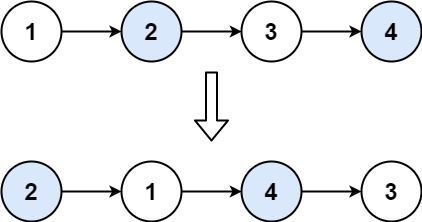Given a linked list, swap every two adjacent nodes and return its head. You must solve the problem without modifying the values in the list's nodes (i.e., only nodes themselves may be changed.)
Example 1:
Input: head = [1,2,3,4] Output: [2,1,4,3]
Example 2:
Input: head = [] Output: []
Example 3:
Input: head = [1] Output: [1]
Constraints:
- The number of nodes in the list is in the range
[0, 100]. 0 <= Node.val <= 100
Approach 1: Iteration
Time complexity
Approach 2: Recursion
Time complexity
# Definition for singly-linked list.
# class ListNode:
# def __init__(self, val=0, next=None):
# self.val = val
# self.next = next
class Solution:
def swapPairs(self, head: ListNode) -> ListNode:
dummy = ListNode(next=head)
pre, cur = dummy, head
while cur and cur.next:
t = cur.next
cur.next = t.next
t.next = cur
pre.next = t
pre, cur = cur, cur.next
return dummy.next/**
* Definition for singly-linked list.
* public class ListNode {
* int val;
* ListNode next;
* ListNode() {}
* ListNode(int val) { this.val = val; }
* ListNode(int val, ListNode next) { this.val = val; this.next = next; }
* }
*/
class Solution {
public ListNode swapPairs(ListNode head) {
ListNode dummy = new ListNode(0, head);
ListNode pre = dummy, cur = head;
while (cur != null && cur.next != null) {
ListNode t = cur.next;
cur.next = t.next;
t.next = cur;
pre.next = t;
pre = cur;
cur = cur.next;
}
return dummy.next;
}
}/**
* Definition for singly-linked list.
* function ListNode(val, next) {
* this.val = (val===undefined ? 0 : val)
* this.next = (next===undefined ? null : next)
* }
*/
/**
* @param {ListNode} head
* @return {ListNode}
*/
var swapPairs = function (head) {
const dummy = new ListNode(0, head);
let pre = dummy;
let cur = head;
while (cur && cur.next) {
const t = cur.next;
cur.next = t.next;
t.next = cur;
pre.next = t;
pre = cur;
cur = cur.next;
}
return dummy.next;
};/**
* Definition for singly-linked list.
* struct ListNode {
* int val;
* ListNode *next;
* ListNode() : val(0), next(nullptr) {}
* ListNode(int x) : val(x), next(nullptr) {}
* ListNode(int x, ListNode *next) : val(x), next(next) {}
* };
*/
class Solution {
public:
ListNode* swapPairs(ListNode* head) {
ListNode* dummy = new ListNode(0, head);
ListNode *pre = dummy, *cur = head;
while (cur != nullptr && cur->next != nullptr) {
ListNode* t = cur->next;
cur->next = t->next;
t->next = cur;
pre->next = t;
pre = cur;
cur = cur->next;
}
return dummy->next;
}
};Iteration:
/**
* Definition for singly-linked list.
* type ListNode struct {
* Val int
* Next *ListNode
* }
*/
func swapPairs(head *ListNode) *ListNode {
dummy := &ListNode{0, head}
pre, cur := dummy, head
for cur != nil && cur.Next != nil {
t := cur.Next
cur.Next = t.Next
t.Next = cur
pre.Next = t
pre = cur
cur = cur.Next
}
return dummy.Next
}Recursion:
/**
* Definition for singly-linked list.
* type ListNode struct {
* Val int
* Next *ListNode
* }
*/
func swapPairs(head *ListNode) *ListNode {
if head == nil || head.Next == nil {
return head
}
res := swapPairs(head.Next.Next)
p := head.Next
p.Next, head.Next = head, res
return p
}# Definition for singly-linked list.
# class ListNode
# attr_accessor :val, :next
# def initialize(val = 0, _next = nil)
# @val = val
# @next = _next
# end
# end
# @param {ListNode} head
# @return {ListNode}
def swap_pairs(head)
dummy = ListNode.new(0, head)
pre = dummy
cur = head
while !cur.nil? && !cur.next.nil?
t = cur.next
cur.next = t.next
t.next = cur
pre.next = t
pre = cur
cur = cur.next
end
dummy.next
end/**
* Definition for singly-linked list.
* class ListNode {
* val: number
* next: ListNode | null
* constructor(val?: number, next?: ListNode | null) {
* this.val = (val===undefined ? 0 : val)
* this.next = (next===undefined ? null : next)
* }
* }
*/
function swapPairs(head: ListNode | null): ListNode | null {
const dummy = new ListNode(0, head);
let cur = dummy;
while (cur.next != null && cur.next.next != null) {
const a = cur.next;
const b = cur.next.next;
[a.next, b.next, cur.next] = [b.next, a, b];
cur = cur.next.next;
}
return dummy.next;
}// Definition for singly-linked list.
// #[derive(PartialEq, Eq, Clone, Debug)]
// pub struct ListNode {
// pub val: i32,
// pub next: Option<Box<ListNode>>
// }
//
// impl ListNode {
// #[inline]
// fn new(val: i32) -> Self {
// ListNode {
// next: None,
// val
// }
// }
// }
impl Solution {
pub fn swap_pairs(head: Option<Box<ListNode>>) -> Option<Box<ListNode>> {
let mut dummy = Some(Box::new(ListNode { val: 0, next: head }));
let mut cur = dummy.as_mut().unwrap();
while cur.next.is_some() && cur.next.as_ref().unwrap().next.is_some() {
cur.next = {
let mut b = cur.next.as_mut().unwrap().next.take();
cur.next.as_mut().unwrap().next = b.as_mut().unwrap().next.take();
let a = cur.next.take();
b.as_mut().unwrap().next = a;
b
};
cur = cur.next.as_mut().unwrap().next.as_mut().unwrap();
}
dummy.unwrap().next
}
}
